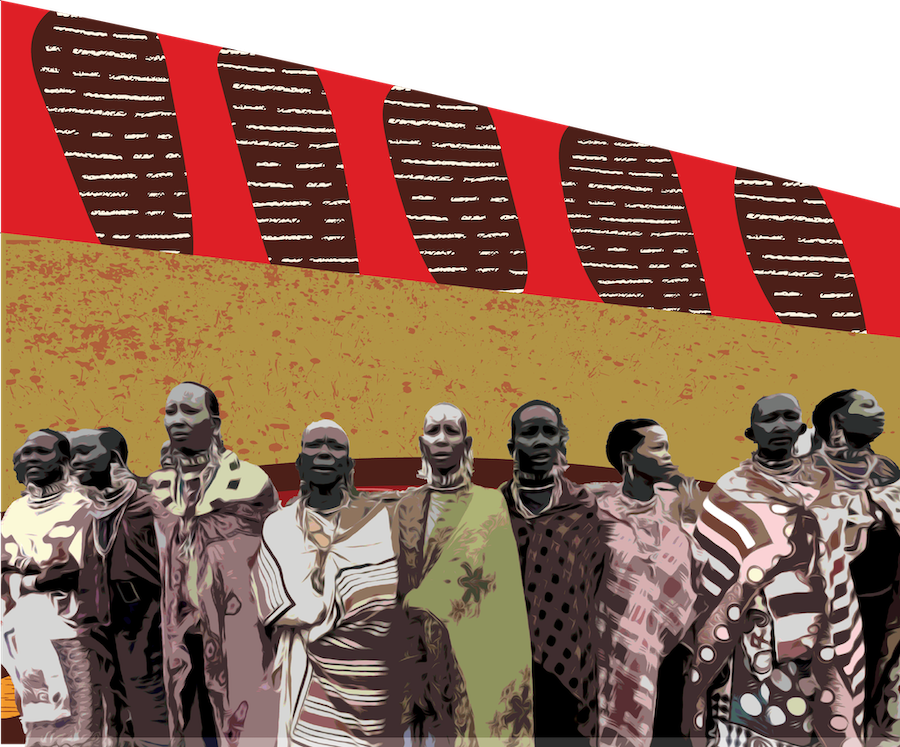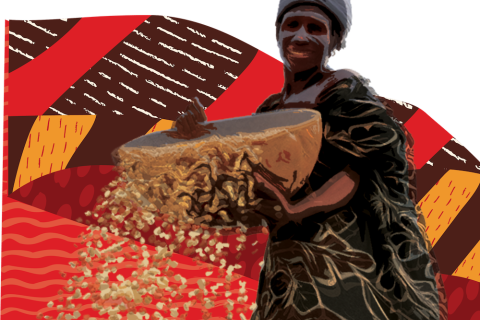Ibrahim has lived on the outskirts of Kenya’s capital city since he was born, 71 years ago. Five generations have lived, loved, studied, worked, and built their homes on this land. He is Kenyan. Proving that to the government and asserting his rights as a citizen, however, has been a life-long struggle.
Ibrahim’s community has been marginalised and disenfranchised for over a century, simply because of their ethnic identity: Nubians. The widespread discrimination they face has made the Nubian community particularly vulnerable to corrupt practices by those targeting the valuable land they occupy.
A long history in Kenya
In the late 1890s, the British Army began recruiting soldiers from across the Nubian regions of Sudan and southern Egypt. They were brought to Kenya to serve in the King’s African Rifles, fighting in both First and Second World Wars.
In around 1905, the soldiers and their families were granted plots of land on the outskirts of modern-day Nairobi. They occupied an area of 4,197 acres of fertile and forested land, establishing a network of plots and compounds where they raised livestock and farmed crops. It came to be known as ‘Kibra’ meaning ‘land of forest’ in the Nubi language.
The colonial authorities issued Nubian families with documents known as ‘shamba passes’ that secured their right to occupy the land indefinitely. However, Kibra was never properly surveyed and individual plots lacked clear demarcation.
“We had large plots that produced a lot of food,” recalls Ibrahim. “The land was beautiful and our lives were simple. Our compounds were separated by forests and connected by paths. The rivers were clean enough to bathe and wash our clothes in the water. There was no electricity but we were very comfortable.”
Service to nation and community
Ibrahim’s grandfather was born in Equatoria, the southernmost region of South Sudan. He was recruited into the King’s African Rifles as a young man and was amongst the first to settle in Kibra in around 1910. After fighting in both world wars, he returned to train the generation of soldiers that founded the Kenya Army and, eventually, became the Imam (religious leader) at the local mosque. Ibrahim’s father followed in these footsteps, becoming the Imam himself whilst working at the dispensary in the local hospital. Ibrahim’s family has deep roots in Kibra; a community they have served faithfully over many generations.
Under siege after independence
When Kenya became independent in 1964, the Nubian community comprised around 95% of the population in Kibra. Within just a few years, Ibrahim recalls, new people started to arrive and settle on the land. “There was tension between some tribes in another part of the region, and two or three groups were forced to flee their lands. Our elders welcomed the displaced people and offered them temporary sanctuary. As I understand it, they were welcomed as tenants but they were not invited to settle permanently, which they did. That was when our problems started.”
Between the late 1960s and early 1980s, the government set about evicting hundreds of Nubian families from their land. No compensation was provided. Their properties were demolished and the community was forced into an ever-smaller area. As the evictions progressed and new people arrived, so the Kibra of Ibrahim’s childhood – with its network of compounds, farms, streams, and forests – completely disappeared. Today, it is the largest urban slum in Africa: Kibera.
Systematic discrimination
Despite having lived in Kenya for generations, members of the Nubian community were routinely denied citizenship or forced to navigate administrative procedures that seemed designed to ensure they could not obtain Kenyan passports or ID cards. “Getting an ID card was almost impossible. We had to prove that our grandfathers were Kenyan and that they died in Kenya. But there were no death certificates at that time! Even the government officials themselves wouldn’t have such documents”, says Ibrahim. “Only Nubians were asked to provide this evidence, nobody else. ”
In Kenya, identity cards are required for all aspects of life: accessing healthcare, applying for a drivers licence or passport, opening a bank account, attending university, even dying needs a valid ID. It’s even necessary to register a mobile phone, without which you cannot use the mobile banking system that Kenyans overwhelmingly rely upon. By frustrating or denying members of the Nubian community access to identity cards, the state actively prevented a whole ethnic group from participating in civil society and life as Kenyans.
“It’s like we are half citizens, not full citizens. People said that we are not Kenyans. In the streets, in the schools, in the government offices. Even the police will doubt your nationality and right to free movement.” The obstacles placed between members of the Nubian community and full citizenship had serious consequences on individuals and families. “I was amongst the best students in my high school, with all the qualifications I needed”, says Ibrahim “but I couldn’t go to university because I didn’t have an ID card.”
Crucially, without the documents necessary to prove their citizenship, the Nubian community was unable to secure their dwindling land.
Land to call home
Today, the community survives on just under 7% of the land they once occupied: just 288 acres. Their ancestral homeland has been taken, occupied, and transformed into a giant slum without even the most rudimentary services. The people of Kibera live in small, flimsy shacks in densely-populated areas. There is inadequate sanitation or safe drinking water for the population, and no government health clinics or hospitals. Just 20% of Kibera has access to electricity.
What the Nubian community does have, finally, is a title deed to their remaining land. A council of elders fought over many years to secure land rights for the Nubian people. Title deeds were eventually granted in 2013, and a community land trust was established. The land is administered as 14 separate villages – each nominating one trustee to help oversee the entire Nubian territory – and is managed according to customary practices. The government has also established a taskforce – dedicated to developing and improving the land – on behalf of the community.
Corruption and discrimination
Looking back over their long period of struggle to achieve land rights, Ibrahim says there is a simple explanation for the government’s long-running refusal to grant secure tenure to the Nubian community: corruption. “There are vested interests amongst government officials,” he says. “This land is prime. Prime. Many people would like to own a piece of that.” Discrimination too plays a significant role in their struggle to secure the land, Ibrahim says. “Many people and entire communities were angry about the Nubians being granted any land at all. Once again, they claimed that we are not really Kenyan.”
The community is planning to claim compensation for the 3,909 acres of land they have lost, and Ibrahim believes they are stronger now than ever before. “We now have Nubian professionals like lawyers, academics, doctors, engineers and teachers. That is a big step for us, as a community, and it’s a real advantage. We also have a lot of support from the wider muslim community in Kenya, who are really backing us.”
To address the ongoing discrimination they face, the Nubian community is lobbying the Director of Minorities for public sector jobs to be allocated to Nubians. Recognised minorities and vulnerable communities in Kenya are allocated a number of jobs in key areas including the army, police, national youth service, various government jobs, and have representation within parliament. However, Ibrahim estimates that just eight Nubians are currently employed in the public sector, while only five have secured positions in local government, and there is no representation in the legislature.
“We are excluded from the public sector and all other areas of Kenyan life because of discrimination, because of our ethnicity. That is what prevents us from getting identity documents and making our way in society. Many Nubians who managed to get ID cards did so by lying about their ethnic origins and changing their names. It is time we were properly recognised as Kenyans, allowed to live our full lives, and able to realise our rights as equal citizens.”
The government has pledged to include the Nubian community in the register by the end of this year. Ibrahim and everyone from the Nubian community will be watching, waiting, and preparing to continue holding the government to account.
======
The experience of the Nubian community shows how discrimination can make people even more vulnerable and exposed to corruption within the land sector. This finding, as well as the myriad ways in which discrimination and corruption interact to deprive individuals and communities of their land rights, is explored in a new report by Transparency International and the Equal Rights Trust: This Beautiful Land. You can download the report here.
Names and other details have been changed in this story to protect the identities of those involved, at their request. We are grateful to ‘Ibrahim’ for sharing his story and the experiences of his community. Our thanks to colleagues from Transparency International Kenya for their important contributions.




